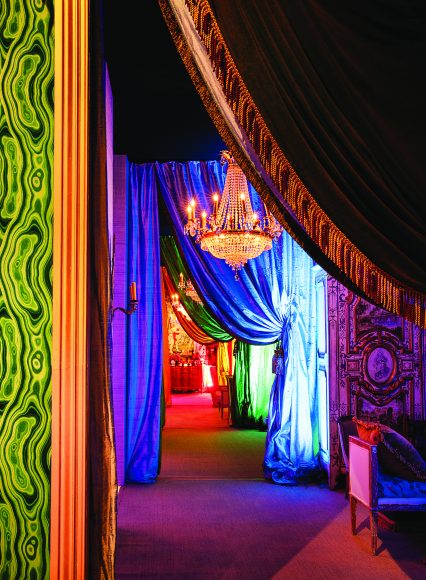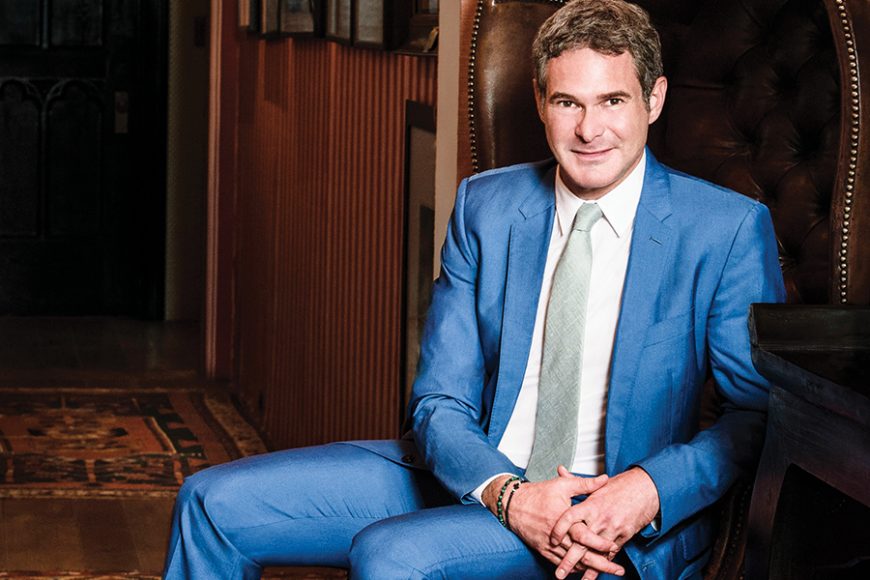“I never knew that what I do — producing parties — was actually a way to make a living, much less a way to make a life,” Bronson Van Wyck writes in the preface to his witty, ravishing new entertainment memoir “Born to Party, Forced to Work: 21st Century Hospitality” (Phaidon).
Therein lies the frisson between an
avocation and a vocation, between what we love to do and what we have to do. It is a frisson that has juiced Van Wyck’s entire life.
Born to a sophisticated, independent-minded family with Greenwich ties in rural Arkansas, Van Wyck attended tony Groton School in Massachusetts and Yale University in New Haven before going on to work for Pamela Harriman — considered one of the most significant hostesses of the 20th century — while she was the American ambassador to France and then as a script reader (and Oscar party crasher) in Hollywood.
“I got here after an extended process of elimination during which I learned I had no other marketable skills,” he writes. But actually, everything he had done was a kind of preparation for the day in 1999 when friend Marina Rust — “a writer and great society beauty” — called at 6 a.m. in crisis mode. She had just fired everyone associated with planning her Maine wedding. Would Van Wyck take up the challenge? And, oh, the wedding’s in a little less than a month.
Van Wyck grabbed his mother, Mary Lynn, who grabbed a truck filled with everything from chandeliers to a stag’s head. His sister Mimi and best friend Celerie Kemble came to help them pull it off. Among the attendees was Vogue editor-in-chief Anna Wintour, who featured the wedding in her magazine, and the mother-son business of Van Wyck & Van Wyck was born.
“In practical terms, our team at Van Wyck & Van Wyck organizes all kinds of events, from intimate weddings to multiday celebrations, all over the world,” he writes. “Our sister company, Workshop, focuses entirely on experiential events that serve as dynamic platforms for communication, persuasion and content creation.”
Graciousness is a big part of Van Wyck’s hospitality tips for readers, and gracious he was in answering our questions prior to his appearance as honorary design chair for the opening- night reception of the Greenwich Historical Society’s Winter Antiques Show Dec. 6:
Thank you, Bronson, for taking the time for the interview and congratulations on the fabulous book — a party in itself. November is WAG’s “avocations” issue, and you have a career that is for others an avocation — entertaining. What part of your job remains a job and what part of it is play?
“My job (which I didn’t even realize was a job when I was growing up) is the definition of work hard, play hard. That inherent duality is why I named my new book ‘Born to Party, Forced to Work: 21stCentury Hospitality.’ There’s a lot of behind the scenes — blood, sweat and tears — that goes into making sure entertaining goes off without a hitch. There’s obviously the preparation, but I don’t really relax until the last guest has been dragged off the dance floor. That being said, so much of what we do is fun. During the design process we get to eat, drink and be merry. We test out the ingredients that make up the recipe for a perfect night and, when the party finally kicks off, we’re there to witness the joy our work brings to others in real time — what could be better than that?”
Do you have any personal avocations or is your career all-consuming? (The book is so witty, we’re wondering if you’ve thought about writing more.)
“I’m lucky to have fallen into a career that I love so my work can be all consuming. Photography and travel are two big hobbies of mine that feed into one another and happily can be done on the job. I read all the time. Right now, I’ve got three books open: Andrew Sean Greer’s novel ‘Less,’ a collection of essays by great historians about the Hanoverian Succession and Wendy Goodman’s book on Tony Duquette. As for writing, as much as I love it, this book was such a long in-the-works passion project that — like any proud parent — I need some time to recover before thinking about the possibility of round two. “
You are honorary design chair of the opening night reception for the Greenwich Historical Society’s Winter Antiques Show. Your father was a ranked tennis player from Greenwich and you’re a Yalie. Tell us a little more about a Southerner’s New England ties.
“My dad grew up in the Northeast and my mom grew up in the South so my childhood was a combination of both of those worlds. My younger years were spent on our family’s farm in Arkansas. We were miles away from my nearest neighbors (who happened to be my grandparents). I went to Massachusetts for school and Connecticut for college. Despite the divide of the Mason-Dixon line, I believe there are a lot of similarities between New England and the South since both tend to celebrate local history. I think when you combine trends with tradition you create something timeless so both the Yankee and the Southerner in me loves weaving our clients’ family heirlooms and heritage into all aspects of our work.”
Your family’s story reads like a cross between the marvelously single-minded artists in George S. Kaufman and Moss Hart’s “You Can’t Take It With You” and Tennessee Williams’ “Cat on a Hot Tin Roof” (which you allude to). What affect does your family continue to have on your work?
“My family is the foundation of everything that I do since the pillars of Southern hospitality run through my blood and everything we produce. They also have a very direct effect on my day to day since my mom and I founded Van Wyck & Van Wyck 20 years ago while my sister Mimi is a partner in the business and heads up our Charleston office. Mom is an endless fountain of ideas who always inspires me with her ingenuity, while Mimi’s ability to juggle thousands of projects at once without ever dropping the ball never ceases to amaze.”
You do not charge for the charitable events you stage. What is the difference in staging a nonprofit event and one for, say, a corporation or celebrity?
“There’s really no difference since the same standard of excellence runs through the production process for all three. On a personal level, I think that the team puts a little more of their heart and soul into nonprofit events since we’re thrilled that our work can help raise funds and awareness for causes we’re passionate about.”
Among the great things about your book are the cultural, historical references — Cleopatra, Queen Victoria. Are we losing sight of historical context in our culture?
“I’m a history nerd so it was very important to me to show that party planning is something that has been an important part of human culture for centuries. The great thing about the internet is that everybody has the ability to become an expert in any subject that interests them, which I think has probably led to a greater cultural understanding of historical context. Take something like Madonna’s new album ‘Madame X.’ If someone loves the cover art and wants to know what inspired it they can learn from a simple Google search that its an homage to (painter) Frida Kahlo which would then most likely snowball into a Wikipedia deep dive into Frida, (her husband, muralist) Diego Rivera and their whole world.”
Many of the hosts you discuss are women, including Pamela Harriman, whom you worked for when she was President Bill Clinton’s ambassador to France. Is hosting still a woman’s province?
“The desire to have fun is universal — not masculine or feminine — so in no way do I think hosting is a woman’s province. Like anything else, you need a variety of voices and perspectives to keep things interesting. I happened to personally learn the tricks of the trade from women and had two of the best teachers in the world in the form of my mom and Mrs. Harriman. However, when I think about epic parties, two of my biggest hosting heroes are men. Ian Schrager and Baron de Redé threw some of the best parties of all time that continue to inspire and inform my work to this day.”
Like us, you are a Greek geek. Tell us more about the ancient Greek influence on your work and the great mythologically themed party you threw on Mykonos.
“The ancient Greeks basically invented the concept of hospitality with the principle of xenia, which is the idea that a host should behave graciously and generously to those who have traveled far from home as a mark of respect and friendship. I’ve wanted to have a myths and legends party since I was 10 years old, so after years of trying and failing to get a client to embrace that theme for one of their own events, I decided I better just do it myself. The ancient Greeks play a leading role in the first chapter of my book, so it was fun to have my research inform the inspiration for the design. Asking my guests to dress up as Greek gods, goddesses, and monsters — the superheroes of my childhood — was a no-brainer. Costumes give people permission to misbehave.”
Bonus question: You are hosting the party to end all parties. Who’s on your guest list?
“My best friends. Nothing beats celebrating with those you love.”
The Greenwich Historical Society’s animal-themed Antiquarius begins with a reception 6 to 9 p.m. Dec. 6. The Winter Antiques Show continues 10 a.m. to 6 p.m. Dec. 7 and 10 a.m. to 5 p.m. Dec. 8 at the Eastern Greenwich Civic Center, 90 Harding Road. For more, visit greenwichhistory.org/antiquarius.






